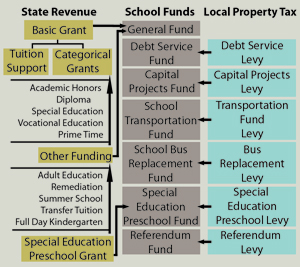
By Sophie Pappas
Bad for business, and bad for students; two phrases that rocked the Bev Harves room in town hall earlier this month during a meeting of the Zionsville Town Council.
Town council was asked by the Zionsville Community School Corporation to show its support in approaching state legislators in regards to the school funding formula.
Unanimously, the group of councilors agreed to support the school corporation in its efforts. Councilman Tom Schuler was not in attendance at the meeting and president Jeff Papa recused himself from the discussion, given his role in state government.
According to town manager Ed Mitro, high-performing schools are “hurt and to a degree shortchanged” by the funding formula that exists on a state level.
“There needs to be a move to get the legislature to change that formula,” he said.
According to a study done by Indiana University via the Center for Evaluation and Education Policy, “leaders from urban and suburban school corporations alike have expressed disappointment with the funding levels they will receive for the next two years.”
The study notes that other fast-growing school corporations like Hamilton Southeastern, have engaged in litigation against the state “on the grounds that the formula does not produce an adequate level of funding to meet the learning needs of their students.”
The study states: “Changes to school funding in Indiana have been substantial in the last few years, and when coupled with the economic recession experienced by Indiana and the nation, school corporations are faced with new and sometimes challenging financial management decisions.”
Although she supports the sentiment that the school funding formula must change, councilwoman Susana Suarez said she is hesitant to make the town council appear as an all-knowing school funding expert.
“I support this resolution… but I have a hard time with language of the resolution,” she said, recommending that the final statement in the document being sent to the state legislature be removed. It reads: “Enough is enough.”
Councilman Steve Mundy said while the council members are indeed not experts in the realm of school funding, the phrase “enough is enough” is powerful and may turn the heads of state legislators.
Chief financial officer for the school corporation Mike Shafer said the present school funding formula works best to serve the communities in Indiana where there are large numbers of impoverished students.
“[The formula] works great for the people at the top of this poverty list,” he said. “But it leaves us way behind and way under-funded.”
Shafer and the school board of trustees are recommending the state create what Shafer calls a “funding floor” at the 30 percent level.
“This is so no school could drop below that level of funding,” Shafer said.
If the state does this, Zionsville schools could see an increase in more than $3 million dollars in state funding. Statewide, the department of education would see an increase in of more than $40 in school funding.
“That sounds like a lot of money. It is a lot of money,” Shafer said. “But with a budget of $6.2 million…it’s not a lot by those standards.”



